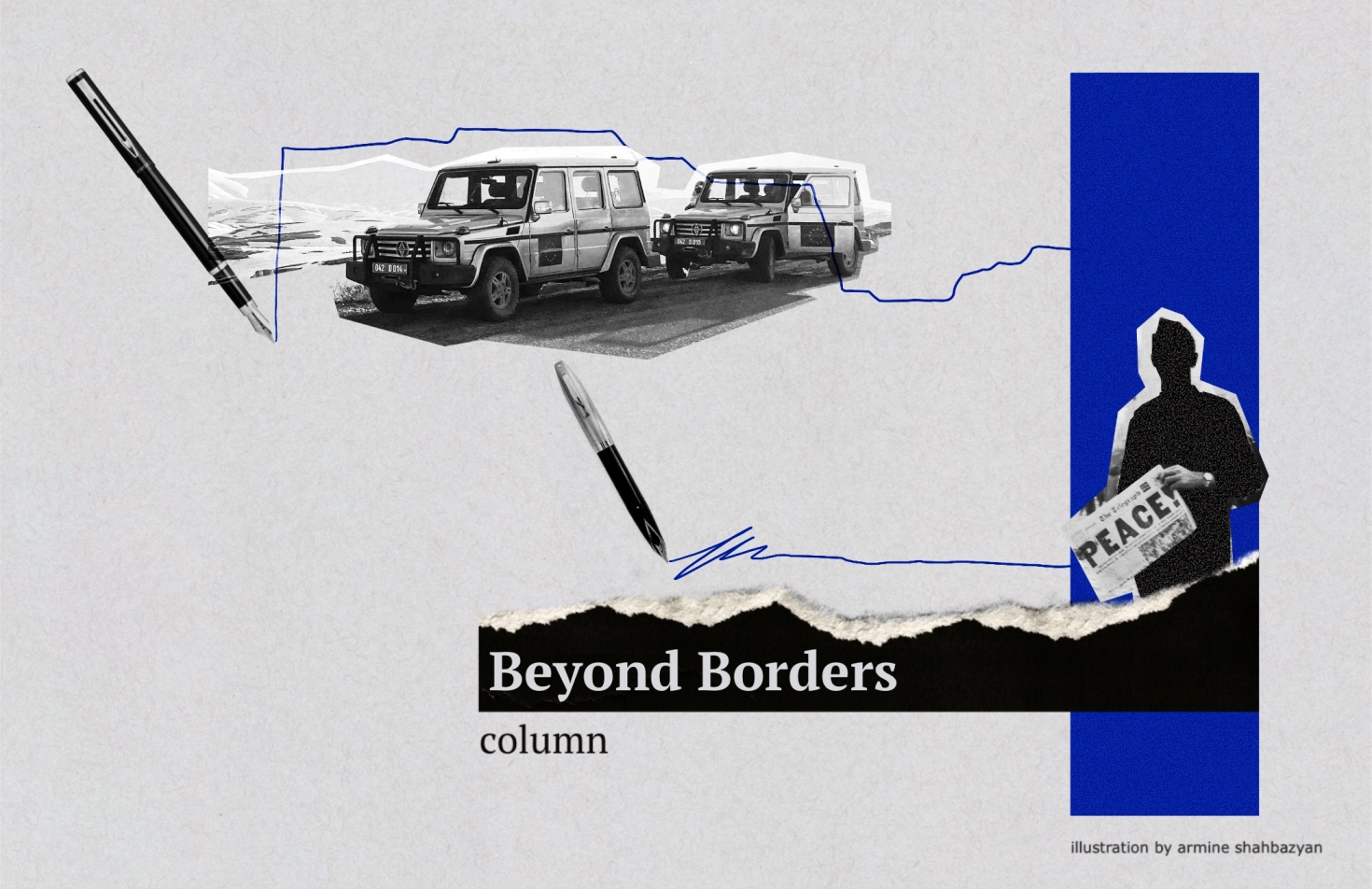[Beyond Borders]
This column explores the key issues shaping life in the South Caucasus, focusing on how the divergent paths of Georgia, Armenia and Azerbaijan reflect the region’s complex histories, economic developments, and political shifts. While new generations in these countries grow more isolated from one another due to language barriers and conflicting national trajectories, the same is true for local policymakers, who are often more familiar with distant capitals than their immediate neighbors. Each nation seeks its own path, sometimes in conflict with others, while international actors often treat the region as a whole, reluctant to craft policies specific to individual states. Drawing on personal experience with the region’s revolutions, conflicts and transformations, Olesya brings you Beyond Borders—a column exploring how decisions made in one corner of the South Caucasus impact all who live there.

Listen to the article.
The announcement came as a surprise. After years of negotiations and the steady exchange of draft agreements, Azerbaijan’s Foreign Minister’s comment marked what seems to be a turning point in the decades-long Armenia-Azerbaijan conflict. However, subsequent statements from both countries’ foreign ministries made one thing clear: despite having reached a mutual understanding on paper, the agreement remains stalled.
While Yerevan expressed its readiness to set a date and venue for the signing, Baku introduced two preconditions—demanding constitutional amendments in Armenia and the formal dissolution of the OSCE Minsk Group. The former, unlike the latter, presents a complex challenge. Dismantling the Minsk Group is largely symbolic, as the institution has long ceased to function effectively, with its last co-chairs having moved on to other roles. But revising Armenia’s constitution may require a national referendum, a time-consuming and politically sensitive process.
The result is an ambiguous, intermediate phase in Armenia-Azerbaijan relations—neither war nor peace, but an uneasy limbo filled with potential flashpoints.
The Risk of Escalation
The timing of the announcement coincides with an uptick in Azerbaijani state media reports hinting at potential military action. Such rhetoric, though not new, has gained momentum amid international preoccupation with the war in Ukraine. Some foreign diplomats, speaking in hushed tones behind closed doors, have voiced concerns that Baku might exploit the diplomatic deadlock to launch a limited military operation this spring, forcing Yerevan to accept not only the existing agreement but additional, more onerous demands.
The official declaration about the end of the peace talks offers a counterweight to such concerns, at least for the moment. Yet, it would be naive to assume the threat has disappeared. Over the past several years, Armenia has engaged in an exhaustive diplomatic effort—navigating complex discussions with Baku, Moscow and international stakeholders—to prevent another war. This work, often underappreciated by parts of the Armenian public and diaspora, remains essential, however frustrating, demoralizing, or even humiliating it may feel. Survival in this geopolitical landscape leaves little room for idealism.
But the risk of tensions along the Armenia-Azerbaijan border remains in place. Military positions in many areas are uncomfortably close, and past skirmishes, some triggered by little more than poor visibility, serve as a reminder of how easily unintended escalation can occur. Moreover, in the context of this conflict, the use of military force remains a time-tested method for exerting pressure in negotiations.
A key challenge in this phase will be maintaining the presence and credibility of the European Union’s Mission in Armenia. According to Armenian Foreign Minister Ararat Mirzoyan, the latest iteration of the peace agreement, declared agreed upon by both sides, includes Baku’s demand for the removal of all foreign forces from the shared border. While the exact implications of this provision remain unclear and most probably will stay a sticking point in expert debates, it could still impact the EU mission’s mandate. Ensuring its continued operation during this fragile interim period will require sustained diplomatic effort.
Already, speculation that the mission might be disbanded upon the signing of the peace agreement could distract policymakers in EU capitals who had considered committing additional resources to the mission, which has been in an expansion phase since last year. Amid EU-wide budget cuts and shifting global priorities—exacerbated by Washington’s recalibration of its commitments to Ukraine—there is a risk that some European states may reduce or withdraw their contributions to the mission.
Equally critical is preserving the mission’s credibility. Civilian monitoring initiatives are designed as early-warning mechanisms, ensuring a swift international response in the event of escalation. Azerbaijan, for its part, has actively sought to discredit the EU mission; not only refusing to cooperate with it but also disseminating footage of routine patrols, which state-controlled media portray as espionage. To counter such narratives, Armenia and its European partners must take proactive steps to reinforce trust in the mission’s work.
The Leverage of an Unfinished Agreement
The announcement that negotiations have concluded carries another significant implication: it establishes the peace agreement as a reference point for future diplomacy. Some may hope that the document remains fluid—subject to future revision depending on domestic politics or shifting geopolitical realities. While this remains a theoretical possibility, such a course would require upending the entire negotiation framework, something Baku is unlikely to accept unless it serves its own interests.
Even without formal signing and consequent ratification, the document will now serve as an anchor for future diplomatic interactions. Should military tensions escalate again, it is likely to form the foundation of any new ceasefire agreement. Conversely, if relations remain stable and discussions advance on border delimitation or regional transit corridors, this agreement will act as a guiding framework for subsequent negotiations.
Beyond its bilateral significance, the agreement will likely also shape Armenia’s broader foreign policy. References to it will inevitably surface in Armenia’s diplomatic engagements with the European Union, impacting not only the future of the EU monitoring mission but also the country’s economic prospects. If Armenia can position itself as a state moving toward stability, it may unlock opportunities for increased investment and infrastructure projects, laying the groundwork for eventual normalization with Azerbaijan and Turkey.
Diplomacy is often a delicate exercise in managing uncertainty, and for Armenia, this transitional period is particularly precarious. The trauma of war and the collapse of Nagorno-Karabakh have left Armenian society and its diaspora deeply unsettled. One option is to remain mired in despair and recrimination. Another is to acknowledge the risks of this evolving reality and prepare accordingly, seeking to minimize vulnerabilities while identifying opportunities, however limited.


